
Guests
- Alex de Waalexecutive director of the World Peace Foundation at Tufts University.
- Tanya Haj-Hassanpediatric doctor who has volunteered in Gaza and Sudan.
Starvation is now being used as a weapon of war in numerous conflicts across the globe — including Sudan, which continues to endure a yearslong famine. Dr. Tanya Haj-Hassan, a pediatric doctor who just returned from Sudan, says that the famine is man-made. “Atrocities in Palestine, atrocities in Sudan that relate to malnutrition, that relate to famine, are a consequence of underlying structures that enable these things to happen,” says Haj-Hassan, who also volunteered in Gaza.
Transcript
NERMEEN SHAIKH: Well, Alex, we want to move on now to Sudan. You point out in your Foreign Affairs piece that Sudan’s famine is the biggest and most intractable in the world. So, if you could explain the origins of this crisis and what you think needs to be done?
ALEX DE WAAL: So, Sudan’s famine has many different layers, going back many years, including ecological crisis, a very distorted, malfunctional economy, especially a food economy, the legacy of past wars, which have left many people destitute, reliant on food relief, and, most particularly, the devastation, including the mass looting and the use of starvation as a weapon by both sides in the current war. So, the immediate challenge is to get a ceasefire and to get humanitarian access, which, of course, doesn’t require a ceasefire but would be greatly facilitated by one.
And there is a plan by the U.S. government, Egypt, Saudi Arabia and the Emirates, who are the — the three Arab states being the ones who are backing the different sides in Sudan. And on this occasion, I think the U.S. Secretary of State Marco Rubio is essentially doing the right thing in trying to get those states together to push a deal on the Sudanese belligerence.
But even if that succeeds — and let’s hope it does — there’s, first of all, a huge challenge in turning that into a real peace process, but an immediate challenge: How are you going to get assistance over thousands of miles? This is not Gaza. This is not something that can be turned around in a day, where you have U.N. agencies standing ready with the resources literally a few miles away. These are places that are hundreds, sometimes a thousand miles away. And, of course, humanitarian aid budgets have been slashed. USAID has been cut to the bone. European aid donors are also cutting their assistance. The U.N. appeal is only 25% funded. So, there is a even — in the best-case scenario, it will take months and a huge commitment of resources and political will to turn this around.
AMY GOODMAN: I wanted to bring in Dr. Tanya Haj-Hassan. Alex de Waal points out that the — in his piece, that the Sudan’s famine is the biggest and most intractable in the world. Dr. Tanya Haj-Hassan, a pediatric intensive care and humanitarian physician, is just back from Sudan. Nermeen?
NERMEEN SHAIKH: If you could tell us, Tanya, when you were there, in August and September, and what you witnessed in the health facilities where you worked? You were also there last year, but in a different area of Sudan.
DR. TANYA HAJ-HASSAN: Hi, Amy and Nermeen. Thanks for having me on Democracy Now!
So, yeah, this past year, I was in Gedaref state, which is sort of in the southeast. Last year, I was in West Darfur, so controlled by different parties of the conflict on both sides. And last year in West Darfur, I mean, the hospital where we were working was pretty dramatically destroyed, and the staff were in the process of trying to rehabilitate it. The town where I was working in felt like a ghost town. There were some people who had moved back. And the children that we were caring for in that hospital were suffering from preventable illness, and there was a large proportion of severe acute malnutrition, along with the complications that come with it, that professor Alex de Waal was talking about. You know, children who are malnourished often have severe immunocompromise. They’re more likely to get disease. They suffer from diarrheal disease, illness, illnesses that sort of perpetuate the cycle of malnutrition.
And then, this past time, so August and September, I saw similar things on the other side of the country, you know, a lot of children suffering from severe acute malnutrition. And it’s devastating to see, because to get to the hospital where I was working, you drive through fields of agriculture, and you think, “How, in this modern world?” Because, you know, I remember growing up and thinking, you know, when I was very young, watching famine in Ethiopia, for example, and I remember thinking to myself, “Well, this is — this is something environmental. You know, this is — this is the climate. This is environmental.” And you grow up, you mature, and you realize these things are man-made.
And I think that’s the important point to make, is that, you know, atrocities in Palestine, atrocities in Sudan that relate to malnutrition, that relate to famine, are a consequence of underlying structures that enable these things to happen. And you can’t have any sort of functional humanitarianism without political systems that are driven by a set of values and principles and that we apply consistently across settings, not just when it’s politically and economically convenient. There are obligations under international humanitarian law that ensure the safety of healthcare workers, the safety of — or, unhindered humanitarian access, including the delivery of food. But at the moment, over 8 million people in Sudan face emergency or famine-level food insecurity, according to the Integrated Food Security Phase Classification, the [IPC] classification system.
NERMEEN SHAIKH: And, Dr. Tanya Haj-Hassan, I mean, you pointed out that in the place that you’re in — where you worked, that’s actually the agricultural center, and yet children were so severely malnourished. We only have 20 seconds.
DR. TANYA HAJ-HASSAN: Yeah, no, that’s true and very shocking. And I think professor Alex de Waal sort of pointed to some of the structural reasons why that’s the case. You know, people can be very poor, with very little access to resources that are at, you know, arm’s reach, as we’ve heard a lot over the last two years in conflicts throughout the world. And that’s why humanitarianism —
NERMEEN SHAIKH: Dr. Tanya Haj-Hassan, I’m so sorry. We’re going to have to leave it there. Dr. Tanya Haj-Hassan and Alex de Waal, executive director of the World Peace Foundation. And that does it for today’s show. I’m Nermeen Shaikh, with Amy Goodman. This is Democracy Now!

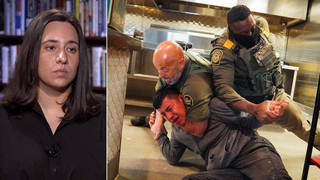
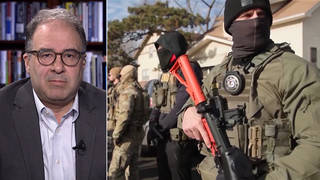
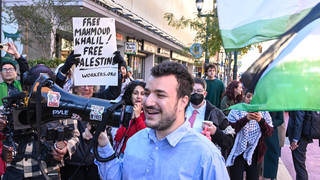
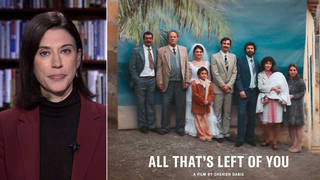



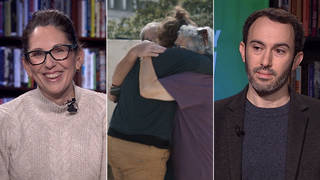


Media Options